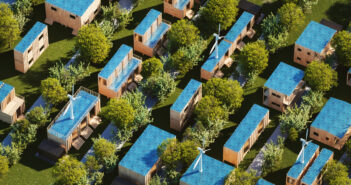The world of work is in flux as technological advances combine with demographic changes to break down traditional barriers between places where we work, live, shop and play. Experts at MIPIM 2018 noted that businesses are demanding buildings that offer flexibility, both in terms of layout and in the lease terms.
Reflecting this, serviced-office provider IWG, formerly known as Regus, finds itself in “the right place at the right time” for the global boom in demand for co-working spaces, according to Paulo Dias, CEO Brazil, Africa and Southern Europe.
“I think in the past we found ourselves sometimes explaining the benefits of using shared working environments or open-plan offices. Now you have employees directly asking for that.” – Paulo Dias, Regus CEO Brazil, Africa and Southern Europe
Regus, which was established over 25 years ago, rebranded at a corporate level to IWG about a year ago, runs serviced offices under a range of brands including Regus, Spaces and No. 18.
And co-working specialist Fora said it is essential that tenants in co-working buildings “feel that it is their space” if owners are going to retain occupants on long-term leases.
The firm’s head of experience, Katrina Larkin, said: “We consider ourselves the guardians of the building,” she said, “but tenants can host their own networking events, they get to have a say in things like the design aspect and the music. We like to get them involved in the details of the building. It’s really all about them.”
HOK design principal Larry Malcic said the design of office spaces should reflect the diverse needs of its occupants and must avoid adopting a one-size-fits-all approach to the work environment.
Malcic, who spoke at MIPIM 2018 on ‘Workplace: the human factor’, said millennial and gen-Z expectations of the working environment, plus a greater understanding that productivity can be raised by creating great places to work, had helped steer office designs in a new direction.
“Far from favouring remote working, Millennials like to have a central workspace where they can come together,” he said, “but they want collaborative spaces where they can be creative and socialise. It’s this collaborative approach that sparks ideas.”
Equally, businesses are increasingly aware of the impact of the workplace on their employees’ wellbeing and on the wider environment. Poland-based HB Reavis has become the first European developer to join the Well Living Lab, a Minnesota-based thinktank that is pioneering research on the interaction between health, well-being and indoor environments.
“The membership underlines HB Reavis’ commitment to going the extra mile to create enjoyable workplaces where people can thrive,” said Jakub Duncko, architect – user experience at HB Reavis. “It allows us to contribute to the science behind what truly drives worker well-being and contentment, while allying with some of the best researchers in the world.”
And French investor Gecina is focussing on its office properties’ wider impact, according to CEO Méka Brunel. “So far as Gecina is concerned, we had a programme to reduce our carbon impact by 2020 and we already this year are carbon neutral when it comes to our offices,” she said.
The next step, Brunel said, is to focus on waste reduction through recycling and reusing. “This circular economy is about how to be innovative and how to create new from the old; to give new life to whatever it might be,” she said. “Architecture is part of that. We should not talk about waste; we should talk about recycling.”
Written by Graham Parker at MIPIM News.
Top photo © EmirMemedovski/GettyImages



